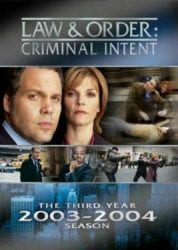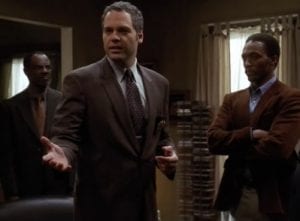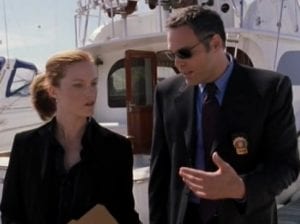Plagiarism in Pop Culture – Law & Order: Criminal Intent (Part 2)
Devil Wears Pravda...

Last week, we took a look at a season 7 episode of Law & Order: Criminal Intent, entitled Self Made, that was based loosely on the James Frey Million Little Pieces scandal.
In that story, Detective Robert Goren and Detective Alexandra Eames investigated the murder of an up-and-coming author and attention turned to both her plagiarist mentor and fabricating author boyfriend.
Eventually, it was discovered that the victim was killed because she was about to expose her colleagues as frauds and mentor and lover conspired to have her killed.
However, that story was not the first time Law & Order: Criminal Intent dealt with plagiarism. In the fifth episode of the third season, entitled Pravda, Goren and Detective G. Lynn Bishop, who was filling in for Eames while she was on maternity leave, confronted a plagiarist based closely on one of the most famous plagiarists of all time: Jayson Blair.
The Plot

The story begins with the stabbing death of Katya Jalenak, a young reporter at The Sentinel, a major New York newspaper. Suspicion almost immediately falls onto Katya’s boyfriend and fellow Sentinel reporter, Carl Hines.
However, Carl says it could not have been him who murdered her as he was away on assignment at the time in Pennsylvania. The detectives spoke with Carl and Katya’s editor, Ben Elkins, who supported that Carl was away at the time. However, he declined to give away the contact Carl spoke with in Pennsylvania, only saying that he spoke with them on the phone.
The detectives began to investigate Katya’s life and discovered that she was experiencing financial trouble, was using drugs and was stealing to get by. They also learned, by talking to Katya’s mother, that she was dating a married man before dating Carl. That married man turned out to be Ben.
They also learned that Carl was using Katya’s credit cards at strip clubs and approached him about that. He said it was with Katya’s permission but Goren pressed him again on his sources. Carl again declined to divulge them but said that they were Old Order Amish. Goren, knowing that the Old Order Amish don’t use telephones, realized there was no way Ben spoke with the sources.
With that information, they began to go through the newspaper’s accounts, specifically the expense reports, to see if there was anything suspicious. They learned that Carl has never submitted any expense reports, despite having done reporting all over the country.
Goren, motivated to dig deeper, quickly found passages in Carl’s articles that were lifted from other sources. All totaled, the found some 40 articles with plagiarism, fabrication or other ethical issues.
After investigating Katya’s email, they learned that she helped Carl with the fraud by providing staff photos that he used to base his articles on. This was apparently part of Katya’s revenge on Ben.
They confronted both Carl and his father, Roy, with this information. Roy defended his son to the detectives but Carl admitted that he had not been completely ethical. However, he strongly denied killing Katya and attention focused back on Ben, under the theory that he killed Katya to keep a lid on the scandal and protect both himself and the paper.
However, Ben was eliminated as a suspect after Goren proved he’d never been to Carl’s apartment. Not even realizing that the apartment was a walk up and didn’t have an elevator.
It was then that the detectives turned their attention to Carl and Roy. They visited the high school where Roy runs the school newspaper (and where Carl got his start in journalism). On Roy’s desk, they found evidence that he owned a handgun and that he was looking at Carl’s work during his time at the paper. They realized that Roy was aware of his son’s misdeeds and began to look deeper into the crime scene.
After some investigation, the detectives confronted both Roy and Carl with evidence that it was Roy who was in the apartment that night, but he intended to kill Carl with a handgun before taking his own life. He didn’t realize Katya was in the house but killed her after she discovered him, and did so with a knife to avoid making too much noise.
Carl, upset with his father, confessed that his dad told him that he had killed Katya but swore that he was there to protect him. With the confession in hand, Roy was arrested for the murder.
Understanding the Plagiarism

There is a lot to unpack in this episode, as it directly deals with plagiarism and the ethical issues around it repeatedly.
The story, as I said earlier, is clearly based on the Jayson Blair plagiarism scandal, which is probably one of the most famous plagiarism scandals of all time.
The overlaps are numerous and include:
- A young black reporter who is considered a rising star at a prominent New York newspaper.
- The reporter is highly supported and promoted by editors, leading to questions of preferential treatment.
- He is accused of both fabrication and plagiarism, specifically for claiming to have gone places and interviewed people that he didn’t.
- The reporter uses photographs and stolen quotes to fake being places he was not.
- He has substance abuse problems (though only alluded to in the episode).
However, perhaps the most compelling piece of information is that the Jayson Blair scandal took place in May 2003. This episode was released in October that same year. That’s just over five months between when the scandal and the episode airing.
However, Law & Order is not a documentary. It obviously took a large number of liberties with the story, including, for starters, adding a murder to it. In addition to the murder, it also added evidence of a cover-up by the editors, which wasn’t present in the Blair scandal. It also changed the discovery of the plagiarism by having the police, not another reporter, spot the copying.
Still, as an analog of Jayson Blair, the character of Carl Hines was a decent stand in. While Carl doesn’t come across as a sympathetic character, he comes across as a complex one, the image of a man, like Blair, who was very talented but also extremely entitled and way out of his depth in his work.
But the conversations about plagiarism were, on the whole, excellent. The detectives clearly took a very dim view of plagiarism and fabrication. During one confrontation with Carl, Carl asked “So you’re saying I made everything up?”
To which Goren responded, “Well, no… Only the things you didn’t plagiarize.”
It was a beautiful mic drop, but the meaningful conversation about plagiarism came at the end of the episode as father and son confronted one another over the issue.
Roy, the high school newspaper editor and former journalist, took a hard line on plagiarism and repeatedly said that he felt his son (and his generation) had everything handed to him. He felt so passionately about the subject that, after learning his son was a plagiarist and fabulist, he attempted to kill him.
Carl, the prodigy, took a different stance, asking, “Who cares about plagiarism?” He said that if you’re a plagiarist you can become a Senator, a likely reference to the Joe Biden plagiarism scandal, or get a TV show, which could be about many TV hosts but likely was about Dennis Leary, who faced allegations of plagiarism at that time and was also the host of a show.
For me, as someone who clearly takes plagiarism, attribution and integrity issues very seriously, this was a gut punch. However, there is truth to it. Not every plagiarism scandal is treated the same and someone in Carl’s position can very understandably feel that it’s unfair.
Why do some plagiarists go on to become Vice President, while others become pariahs? A lot of it has to do with the details of the plagiarism, but a lot of it just plain inequality in treatment.
It’s a provocative scene and, while it doesn’t support plagiarism, it shows a lot of the complexity and nuance around the issue. Carl isn’t the episode’s hero, but he’s not the villain either.
Indeed, it’s his father, the crusader for honestly and integrity in the media, who ends up playing the villain role. While he may be a hero when it comes to fighting for integrity, his myopic and simplistic view pushed him to do deeds far worse than plagiarism.
While it may be an exaggeration for effect, it does show the dangers of taking this fight too far and how, sometimes, there are things worse than plagiarism and falsification.
Bottom Line
As I said previously, I’m a pretty big fan of Law & Order: Criminal Intent. Of all the flavors of the series, this is the one that delves the most into the psychology and the “Why?” rather than just the “Who?” and “How?”
That makes it a great vehicle for discussing plagiarism as well as other nuanced topics and, between this and the “Self Made” episode we discussed earlier, the show did a good job twice over.
But, if I may play the role of Detective Goren for a moment, I did find one thing very interesting in the final scene.
During the final confrontation, Carl asked the question, “What’s the big deal about plagiarism?”
That’s a bizarre thing to ask at that moment. While plagiarism was a big part of the case against him, the much broader ethical issue was the fabrication. He had repeatedly lied about trips he’d made, failed to submit expense reports, and misled both his paper and his audience.
Yes, plagiarism is a very big deal, but fabrication is at least equally important, if not more so. Yet, in the heat of the moment, he latched on to plagiarism.
The reason, I hypothesize, is because Carl, much like Jayson Blair, believed strongly in his talents and felt that he was extremely gifted. Fabrication is a serious ethical failing, but plagiarism is both an ethical failing and a sign that an author has a lack of confidence in their own work.
This theory is backed up by what Carl says later in the conversation, when he brags that he fooled many of the best editors in the country, including his dad.
That strikes to the very core of the type of plagiarist that Carl and his real-life counterpart are, plagiarists caught up in their ego and a constant need to prove that they’re the best.
Even if it means being the best at plagiarism.
More Plagiarism in Pop Culture (In Reverse Order)
Want more Plagiarism in Pop Culture? There Are 40 others to check out!
- Ferris Bueller
- Randy Feltface
- Bob’s Burgers
- Columbo (Part 2)
- Columbo (Part 1)
- Death in Paradise (Part 2)
- American Auto
- Saturday Night Live
- The Conners
- Death in Paradise (Part 1)
- Lobachevsky
- Back to School
- The Golden Girls
- Young Sheldon
- The Goldbergs (Part 2)
- King of the Hill (Part 2)
- Yesterday
- King of the Hill (Part 1)
- The Kids Are Alright
- Big Fat Liar
- Coco
- Re-Animator
- Elementary
- Instinct
- Fresh Off the Boat
- The Goldbergs (Part 1)
- Lou Grant
- Star Trek: The Original Series
- Arthur
- Criminal Minds
- Mystery Science Theater 3000
- Cheers
- WKRP in Cincinnati
- Boy Meets World
- Law & Order: Criminal Intent (Part 2)
- Law & Order: Criminal Intent (Part 1)
- Jane the Virgin
- The Waltons
- Leave it to Beaver
- The Facts of Life
Want to Reuse or Republish this Content?
If you want to feature this article in your site, classroom or elsewhere, just let us know! We usually grant permission within 24 hours.
